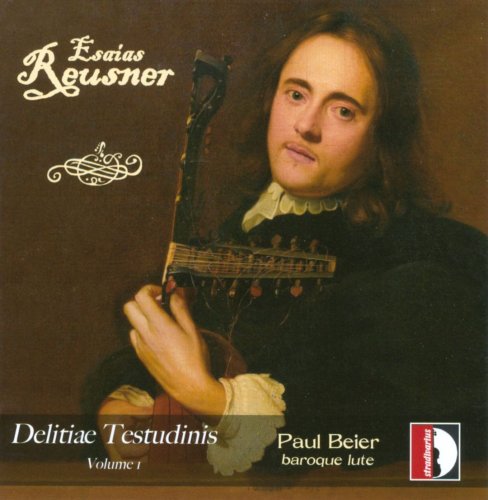
Paul Beier - Reusner - Delitiae Testudinis, Vol.1 (2011)
BAND/ARTIST: Paul Beier
- Title: Reusner - Delitiae Testudinis, Vol.1
- Year Of Release: 2011
- Label: Stradivarius
- Genre: Classical
- Quality: FLAC (tracks+.cue,log,scans)
- Total Time: 78:47
- Total Size: 401 Mb
- WebSite: Album Preview
Tracklist:
1. Delitiae Testudinis: Suite 9 in Sol minore. Praeludium
2. Paduana
3. Allemanda
4. Couranta
5. Sarabanda
6. Gavotta
7. Gigue
8. Delitiae Testudinis: Suite 4 in La minore. Paduana
9. Allemanda
10. Couranta
11. Sarabanda
12. Gavotte
13. Gigue
14. Delitiae Testudinis: Suite 13 in Mi-b maggiore. Paduana
15. Allemanda
16. Couranta
17. Sarabanda
18. Gavotte
19. Gigue
20. Delitiae Testudinis: Suite 11 in Do minore. Paduana
21. Allemanda
22. Couranta
23. Sarabanda
24. Gigue
25. Delitiae Testudinis: Suite 14 in Fa minore. Allemanda
26. Couranta
27. Sarabanda
28. Gigue
Performers:
Paul Beier - baroque lute
1. Delitiae Testudinis: Suite 9 in Sol minore. Praeludium
2. Paduana
3. Allemanda
4. Couranta
5. Sarabanda
6. Gavotta
7. Gigue
8. Delitiae Testudinis: Suite 4 in La minore. Paduana
9. Allemanda
10. Couranta
11. Sarabanda
12. Gavotte
13. Gigue
14. Delitiae Testudinis: Suite 13 in Mi-b maggiore. Paduana
15. Allemanda
16. Couranta
17. Sarabanda
18. Gavotte
19. Gigue
20. Delitiae Testudinis: Suite 11 in Do minore. Paduana
21. Allemanda
22. Couranta
23. Sarabanda
24. Gigue
25. Delitiae Testudinis: Suite 14 in Fa minore. Allemanda
26. Couranta
27. Sarabanda
28. Gigue
Performers:
Paul Beier - baroque lute
Recordings by solo lutenists have been numerous since the beginning of the 21st century. Cynics would say that in an era of declining government subvention it's cheaper to pay a single lutenist than an orchestra or choir, but it's also true that the lute repertory of the 17th and 18th centuries has historically been undervalued, left to a few specialists, despite the fact that court lutenists were some of the most celebrated and highly paid musicians of the time. This recording deals with a 1667 publication, Delitiae Testudinis (Delights of the Lute), by the little-known Esias Reusner, who was active in the German city of Brieg (now Brzeg, Poland). British-Italian lutenist Paul Beier in his notes points to the lingering effects of the Thirty Years' War in the music of Reusner, who was 12 when the war ended with the Peace of Westphalia in 1648. Whether that's a bit far on the speculative side is for the listener to determine, but Beier makes two solid points: these dance suites for lute, which were the first publications of music in the French style in Poland after the war's end, are unusually serious works, and they have a dense, polyphonic quality that seems to look back to the Renaissance. This is so even though Reusner was writing for the 11-course Baroque lute, which became standard only in the coming decades. Reusner's suites have the quality of Renaissance motet intabulations to which French ornamentation has been added to the top line, and they're so sober and dense, even in the major-key pieces, that it's easy to forget you're listening to dances. It's quite an impressive effect, and Beier interprets the music with a relaxed confidence. The sound, recorded in a church in the Lombard town of Eupilio, is a bit live, but at least the engineers do not make a fetish of distracting instrument noise.
Classical | FLAC / APE | CD-Rip
As a ISRA.CLOUD's PREMIUM member you will have the following benefits:
- Unlimited high speed downloads
- Download directly without waiting time
- Unlimited parallel downloads
- Support for download accelerators
- No advertising
- Resume broken downloads


